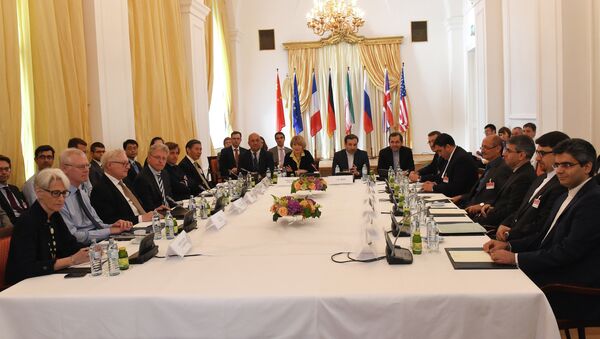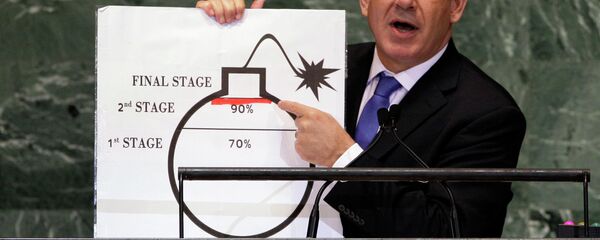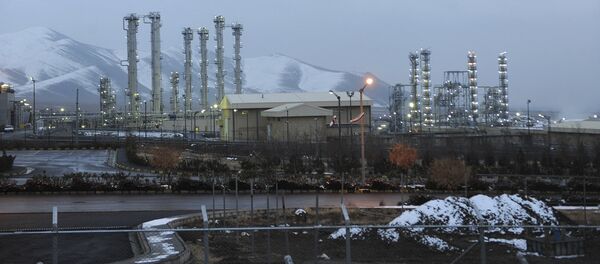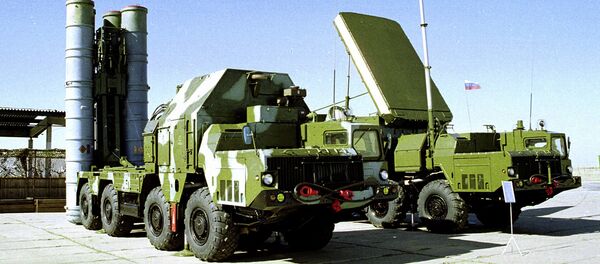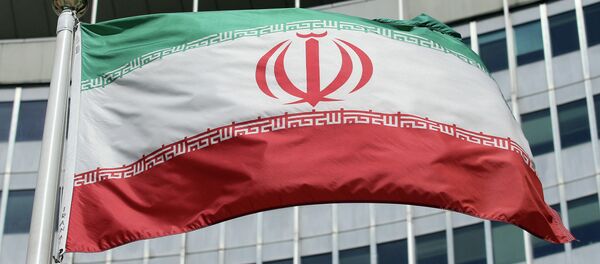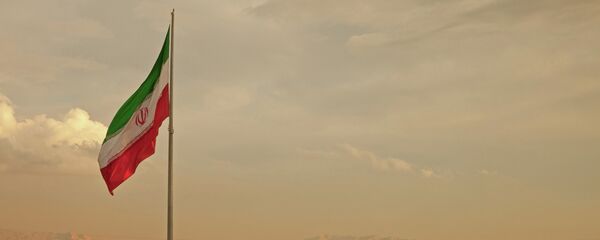The sweeping accord ushered in a new era in relations between Tehran and the West, formally ending a 12-year standoff on the issue.
Through hardships to the stars
Multiple deadlines were missed in 2015 as Iran and the six world powers sought to overcome their differences and find a means to limit Iran’s nuclear activities.
In compliance with its commitments under the preliminary framework accord, Iran agreed to curb its nuclear activities over the next 10 to 15 years, including reducing its number of centrifuges by more than two-thirds and cutting its stockpile of low-enriched uranium by 97 percent.
The framework deal was described by EU foreign policy chief Federica Mogherini as a "decisive step." It was especially hailed in Iran, with its citizens celebrating the looming prospect of a deal in the streets, full of hope of alleviating the burden of sanctions.
Back on track
The framework agreement on the Iranian nuclear program unlocked the stalled agreement between Moscow and Tehran on the delivery of Russian S-300 air defense systems.
Shortly after the P5+1 group of international negotiators and Iran agreed to the framework nuclear accord in April, Russian President Vladimir Putin lifted the ban on the contract’s execution.
Commenting on the presidential decree, Lavrov said that the ban had become obsolete, citing the progress which Russia, the United States and four other world powers had achieved at the talks with Iran on its nuclear energy program.
Moving forward with the implementation of contractual obligations, the head of Russia’s state technologies corporation Rostec announced on November 9 that a contract with Iran on the delivery of S-300 missile systems had been signed.
Iran pledged to withdraw its court case against Russia for the non-delivery, as soon as the initial stages to the contract had been fulfilled, CEO of Rostec, the manufacturer of the S-300 battalions, Sergei Chemezov emphasized.
Although Tehran expected to receive Russian-made S-300 air defense systems by the end of 2015, Vladimir Kozhin, Russian presidential aide on military-technical cooperation, said on December 14 that the deliveries would take time and would most likely continue through 2016.
It's a deal
The deadline for a final agreement on Iran's nuclear program had been set for June 30, 2015. However, high-stake talks in Vienna went past the target date, with several extensions pushing the negotiations out by two weeks.
Under the Joint Comprehensive Plan of Action (JCPOA), Iran agreed with the international negotiators to curb its sensitive nuclear activities, in particular, to reduce its stock of enriched uranium, decrease the number of centrifuges in the country, reconfigure the heavy-water reactor at Arak, as well as refrain from any uranium enrichment at the Fordow nuclear fuel facility.
The deal still allowed Iran to continue its uranium enrichment-related activities, including safeguarded Research and Development [R&D] in the Natanz Enrichment facility, but the country pledged to keep the level of its uranium enrichment under 3.67 percent for a period of 15 years.
To prove that it is complying with its obligations, Iran promised to allow the International Atomic Energy Agency (IAEA) to monitor of its nuclear activities for 25 years.
Sanctions relief in exchange for compliance
Tehran was unable to persuade the West to lift all the sanctions imposed against the country straightaway after the agreement came into force.
The UN arms embargo against Iran will remain in place for five years and the missiles embargo will apply for another eight years, according to the nuclear plan.
Nevertheless, Iranian President Hassan Rouhani called the current state of affairs with the pact a "success," stating that his country had achieved all the goals it had for the negotiations.
According to Russian Foreign Minister Sergei Lavrov, the agreed schedule of sanctions removal is a result of the joint efforts of Russia and China, and a compromise between Iran and the West.
"As for the arms embargo, together with China we have urged for its lifting as one of the first measures that should be stopped. As a result, our Iranian colleagues — they had the last word in this matter, as you understand — agreed to compromise, and since the West initially insisted on the 8-10-year embargo, the Iranian side and the West reached a compromise, that we and China supported [it], and it suited Iran — five years," Lavrov said.
The nuclear deal paved the way for some of the Western nuclear-related economic and financial restrictions against Tehran to be lifted immediately.
The much-touted agreement on the Iranian nuclear program implies that Brussels will lift the constraints it has imposed on Iranian banking and insurance operations. The EU limitations on the import of Iranian oil and gas, as well as on the export of EU resource extraction equipment, will also be removed.
US Secretary of State John Kerry repeatedly stressed that the easing and lifting of sanctions against Iran would take place only if the country complied strictly with all its commitments under the new deal.
A provision of the agreement stipulates the restoration of sanctions within 65 days should Iran breach any of the points included in the deal.
The lifting of sanctions is viewed in Iran as a practical way of resuming cooperation with its both regional and international partners.
International reaction
Supporters of the deal cheered the breakthrough talks between the world powers and Iran, expressing hope that it would contribute to peace and stability in the region and enhance dialogue among the states involved.
In his address to the nation, Iran's Rouhani welcomed the recently inked deal describing it as a "good agreement."
"I announce to our people that our prayers have come true," the Iranian president said in the address.
US President Barack Obama praised the accord, stressing that the agreement had met the objectives he had in mind throughout the negotiations.
"Today after two years of negotiation the United States together with the international community has achieved something that decades of animosity has not: a comprehensive long-term deal with Iran that will prevent it from obtaining a nuclear weapon," Obama said, speaking in the White House.
According to Obama, the agreement is not built exclusively on trust, but on verification mechanisms.
A day after the historic deal was reached, Obama called Putin and thanked the Russian president for "Russia's important role in achieving this milestone, the culmination of nearly 20 months of intense negotiations."
Russian President Putin saluted the important agreement, stating that Russia will do all it takes to ensure that the deal operates in full.
"We are sure that the world today breathed a sigh of relief," Putin said adding that the deal will enhance international and regional security, global non-proliferation efforts and even the struggle against terrorism.
Meanwhile, the accord, which leaves Tehran with an even-reduced nuclear capacity, has profoundly alarmed Israel and its neighbors in the Gulf. Israeli Prime Minister Benjamin Netanyahu claimed the deal was a "bad mistake of historic proportions" that would enable Iran to "continue to pursue its aggression and terror in the region."
Saudi Arabia, a Sunni regional rival to Shia Iran, also warned that the compromise deal did not present an obstacle to Tehran ultimately obtaining a nuclear bomb.
All eyes on the United States
After the nuclear accord was clinched, the focus of attention shifted to the US Congress, which was either to approve or reject it in September.
Braced to persuade the skeptical US legislature of the agreement’s advantages, Obama stated confidently that it would oblige Iran to remove two-thirds of its installed centrifuges and place them under international supervision, cap uranium enrichment at 3.67 percent, consent to the reinstatement of restrictive measures if the deal was violated as well as granting the IAEA expanded access to the Iranian nuclear facilities.
After weeks of heated debates, US Senate Democrats had succeeded in blocking a Republican-led attempt to reject the agreement by September 17, the Congressional review deadline for the nuclear deal.
"Today, the Senate took an historic step forward and voted to enable the United States to work with our international partners to enable the implementation of the comprehensive, long-term deal that will prevent Iran from obtaining a nuclear weapon. This vote is a victory for diplomacy, for American national security, and for the safety and security of the world," Obama said in a statement issued on the US Senate’s vote.
In the follow-up to the deal’s close scrutiny, the US president instructed US government agencies to take all appropriate measures to implement Washington’s commitments under the JCPOA on October 18. This date marked "Adoption Day" under the nuclear deal, or 90 days after the UN Security Council had approved the agreement.

